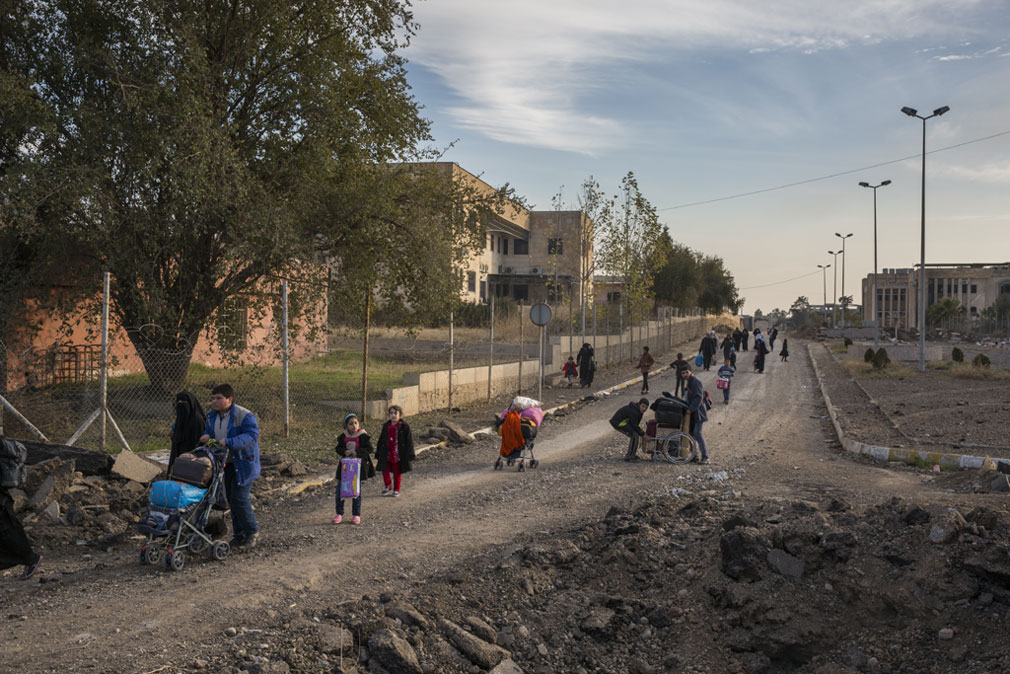Fear of New Wave Of Displacement As Fighting Escalates In Iraq

NEW DELHI: Fighting has escalated across parts of Iraq, as Iraqi forces backed by U.S. support move into Mosul where civilians remain trapped, and reports suggest that many are risking their lives to flee Hawija, which remains under the control of the Islamic State.
The United Nations refugee agency and its partners are coordinating plans to respond to a potential mass displacement of Iraqis from western Mosul, the latest battleground the Iraqi forces are seeking to retake from the Islamic State, a release by the UN says.
At present, Iraqi forces have driven the militants out of east Mosul, and are set to expand their major offensive into the western half of the biggest city in northern Iraq. The situation in Hawija, however, is different, as although all agree the urgency of expelling ISIS militants from the area, there is no concrete plan as yet on how to do so.
“As many as 250,000 Iraqis could be displaced from their homes with the anticipated escalation of conflict in densely-populated western Mosul,” Matthew Saltmarsh, a spokesperson for the Office of the UN High Commissioner for Refugees (UNHCR), told reporters in Geneva.
The military operations to oust ISIS began on 17 October last year in eastern Mosul, which, according to UN agencies on the ground, is now under the Government control.
Saltmarsh said UNHCR has seven camps completed and two under construction. UNHCR is currently able to provide some 11,000 families, or 66,000 people, with shelter as part of the Mosul response, a figure which should expand to 20,000 families, or 120,000 individuals, in the near-term, once land is allocated.
The refugee agency continues to seek additional land for new camps, reception and transit areas, to assist people closer to Mosul. By the end of March, it is anticipated that the Government of Iraq, working with UNHCR and its partners, could potentially host 41,155 families, or 246,930 people, in camps and emergency sites.
Some 161,178 people have been displaced from Mosul and surrounding areas since the military offensive began in October, but nearly 30,000 of them have returned to their places of origin.
Returnees are keen to resume their lives and told UNHCR that the re-opening of schools and government offices was a factor in their decision to return. In some areas, security and the lack of food and water remain a concern. Some returnees continue to rely on emergency relief items, including kerosene, which they received while in camps.
UNHCR is also assisting increasing numbers fleeing Hawija, 130 km south-east of Mosul, due deteriorating living conditions and the expected intensification of military operations.
Inter-agency planning estimates predict that up to 114,000 individuals could be displaced from Hawiga. So far, 82,128 people have fled since August 2016. Until recently, people had been leaving Hawija in smaller numbers but hundreds are now fleeing eastwards daily towards Salah al-Din and Kirkuk.
Rudaw reports: “The long-delayed offensive to recapture the ISIS-held town of Hawija, west of Kirkuk, is once again on the agenda as the Kurdish Peshmerga expects the military operation to kick-off in the near future, an optimism not shared by Hawija local authorities.
Sheikh Jaafar Mustafa, commander of Peshmerga’s 70 Forces, believes that the offensive could begin in February.
“I think the Hawija operation is not far,” Mustafa told Rudaw on Wednesday, mindful that a joint plan between various actors has not been finalized. “Especially right now, may be towards the end of the next month, or [even] early on next month.”
He called for what he described an “active” participation of Peshmerga and local forces, indicating that there is not a well-thought plan in place yet.
“Without the active participation of Peshmerga, and the local commanders [responsible for] areas around Kirkuk, the Peshmerga ministry and Kirkuk governor, the operation would not be possible.” Mustafa said.
There are about 150,000 people still living in areas controlled by ISIS in Hawija and its vicinity, the town’s mayor told Rudaw, complaining that Baghdad is not aware of the suffering of these people, and therefore has delayed the offensive time and again.”
(Cover Photo: Iraqi families flee east Mosul through the recently liberated Mosul University complex. Photo: UNHCR/Ivor Prickett)



